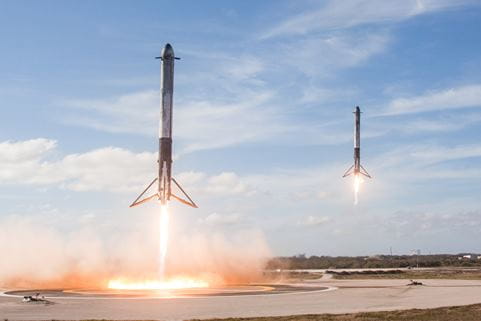World Remanufacturing Day: celebrating the commercial and environmental benefits of the circular economy
If rockets can be reused, then a lot of other things should be too! Today is World Remanufacturing Day. Remanufacturing and the circular economy go hand in hand and Panalpina helps its customers make the transition to circular supply chains in multiple industries; remanufacturing mobile phones, repairing telecoms equipment, repacking fashion products and screening and testing optical equipment.

Today is World Remanufacturing Day! “Remanufacturing is only one part of the after-market solutions that we provide at Panalpina, but it is a very important part and it looks set to become even more important for our customers in the future,” says Mike Wilson, global head of Logistics and Manufacturing at Panalpina. Remanufacturing and the circular economy, something Panalpina has talked about before, go hand in hand.
In the past, supply chains have grown longer with the trend for manufacturing companies to move production to low cost geographies far from customer demand.
However, these elongated “take-make-dispose” supply chains that have been successful for many years are rapidly losing relevance in light of the transition to shorter, circular supply chains. The world is already seeing a shift away from centrally manufactured products which are shipped through a global transport network and sold once, to more localized manufacturing with products returning and being resold multiple times through their lifecycle.
Commercial opportunities
This shift towards the circular economy is being driven by manufacturers and retailers who see the enormous commercial opportunities in the after-market supply chain, which includes product upgrade services, spare parts sales, product repair, remanufacturing and brokerage opportunities such as selling used products into new markets. All of which are services that Panalpina provides as part of its wider LMS offering.
“The transition from take-make-dispose supply chains to the circular supply chains of the future is happening faster than we expected,” says Wilson.
Customers increasingly ask for Panalpina’s help to identify and exploit commercial opportunities in their after-market supply chain, whether this is about increasing their after-sales revenues, reducing operating costs or freeing up inventory, or a combination of all three.
Panalpina helps its customers take advantage of the transition to circular supply chains in multiple industries across the globe; remanufacturing mobile phones in Dubai, repairing telecoms equipment in Mexico, repacking fashion products in the US and screening and testing optical equipment in Germany.
Journey to the circular supply chain
A broader view of the opportunities that circular supply chains offer can be found in a recent white paper produced at the Panalpina Centre for Manufacturing and Logistics Research at Cardiff University.
Authored by Wilson and titled Journey to the circular supply chain, the industry report on the future of manufacturing supply chains and logistics has been endorsed by the European Remanufacturing Council.
The European Remanufacturing Council, of which Panalpina is a leading member, was recently recognized at the Davos World Economic Forum as a best practice example of industry and academic collaboration. The Council supports companies and governments in making the transition to circular supply chains.
Environmental and societal benefits to be gained as well
Although the transition to circular supply chains opens up enormous commercial opportunities, there are environmental and societal benefits to be gained as well. For World Remanufacturing Day, Panalpina headquarters supported a local charity by collecting, fixing and repurposing used laptops, tablets and phones from Panalpina employees that will be donated to a school in Africa.
“We want to show that as individuals as well as a company, Panalpina is committed to making the most of the commercial and environmental opportunities in the transition to circular supply chains,” says Andy Lahy, global head of Logistics Strategy and Innovation at Panalpina, who is behind the initiative.
The reuse of products must not always be as complicated as rocket science. Every contribution counts to make the circular economy take flight.
